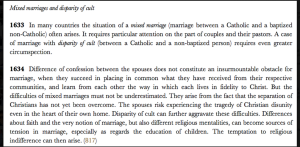The Q: “You called cohabiting a litmus test, like a litmus test is a bad thing. But don’t we do the same thing when we date? We kind of are ‘trying out’ marriage. What’s the huge difference?” -Alexandrea
The A: The short version of my answer is this: If in dating we are “trying out” marriage, we better hope we are dating right. But here’s the long version:
To quote what I wrote in the essay on DevotionalDiva.com that sparked this question, “For (some), cohabitation is a litmus test. If it works, you get married. If it doesn’t, you don’t. Because it’s better to say ‘I’ll love you if…’ instead of ‘I’ll love you despite what’s yet to come…’ For others, cohabitation is like a practice run. If you like it, you commit. If you don’t like it, you call it quits.”
In our culture, dating largely involves rose colored glasses and committing because “I think you’re hot and I kind of want to have sex with you.” Our relationships can live or die by how constantly we’re warm and fuzzy. We live together (until it’s difficult) and sleep together (unless in doing so we learn that achieving sexual compatibility will take work). There is more thought dedicated to text messages you intend to send a guy (based solely on your friends’ answers to questions like “What would YOU think of this phrase if you were him?”) than there is thought dedicated to whether his skills are transferable to, say, parenting.
In our culture (and in my observation) there is no huge difference between why many couples decide to cohabit and why many couples decide to date (and why most couples don’t wait until after the wedding for sex, while we’re at it).
This is a problem.
This is not a problem because it renders chaste daters’ decisions not to cohabit or have sex totally moot (it doesn’t).
It’s a problem because of what it says about how we date.
Alexandrea is right: In dating, we test for stuff. If we didn’t test for some things, I would have married the first guy I dated (and he wore eyeliner, so…*). This is really to say that litmus tests aren’t necessarily bad (i.e., “You can’t save sex for marriage? Then I can’t marry you.”). But our culture tells us to use the wrong methods to test for the wrong stuff.
Our culture says cohabitation and premarital sex are the best tests.
Our culture also says “test for how constantly and consistently you feel warm and fuzzy” instead of for how constantly and consistently he or she does what he or she says he or she’s gonna; “for how easy it is to live together” instead of for how willing and able he or she is to work through conflict; “for how effortless gratification is” instead of for how patient he or she is.
It is good to “test” in dating, but we’ve got to test for the right stuff. When we test for the right stuff, we create a huge (and important) difference between cohabiting and dating.
– – – –
This post is part of an occasional series called Q&A. Click here to read all the posts from it.
*In the event he stumbles upon this, JK. You were a in a band. It was acceptable.




